DCPA NEWS CENTER
Enjoy the best stories and perspectives from the theatre world today.
Enjoy the best stories and perspectives from the theatre world today.
This article was published on February 21, 2018
Video by DCPA Video Producer David Lenk and Senior Arts Journalist John Moore.
In this daily four-part series for the DCPA NewsCenter, we introduce you to the plays and playwrights featured at the Denver Center’s 2018 Colorado New Play Summit. Over the past 13 years, 29 plays introduced at the Summit have gone to be premiered on the DCPA Theatre Company mainstage season. Today: David Jacobi, author of The Couches.
The Couches, says Philadelphia playwright David Jacobi, is play ripped from the headlines. In 2013, a 16-year-old Texas boy named Ethan Couch drove drunk and killed four people, paralyzing one other. With seven teenage passengers in his father’s truck, Couch sped into a disabled SUV on a rural road and plowed into a Samaritan’s nearby parked car, which in turn hit an oncoming Volkswagen Beetle.
During the trial, his lawyer argued that he was too rich to know right from wrong.”
They called it “affluenza,” and it’s actually a word in the dictionary: “A psychological malaise supposedly affecting wealthy young people, symptoms of which include a lack of motivation, feelings of guilt and a sense of isolation.” The term dates back to 1957 as a commentary on consumerism, but it is now most commonly associated with the 2013 Couch case.
But rather than prison, Couch was given rehab and probation, which he promptly violated. “So my play begins after his mother has taken $40,000 and driven him to Mexico, where they’re hiding in an all-inclusive resort,” Jacobi said.
The resulting play, he said, explores the playwright’s feelings on late-stage capitalism, overconsumption and the idea that creating wealth is tied to a loss of morality.
“It’s about the financial inequity of the world we live in,” Jacobi said. “The inequity in our criminal system. The inequity between the haves and the have-nots.
“It’s all so messed up.”
Here’s more of our conversation with Jacobi, one of four featured playwrights at the 2018 Colorado New Play Summit:
John Moore: Did you feel any kind of empathy for the young man who killed all those people?
David Jacobi: I don’t pity the Couches. But at times I feel like I understand them and where they’re coming from. I feel we are complicit in a system that dehumanizes people on both ends to an extent — the poor and the rich.
John Moore: What did you think when you first heard about the Ethan Couch case, and how it brought the word “affluenza” into the lexicon?
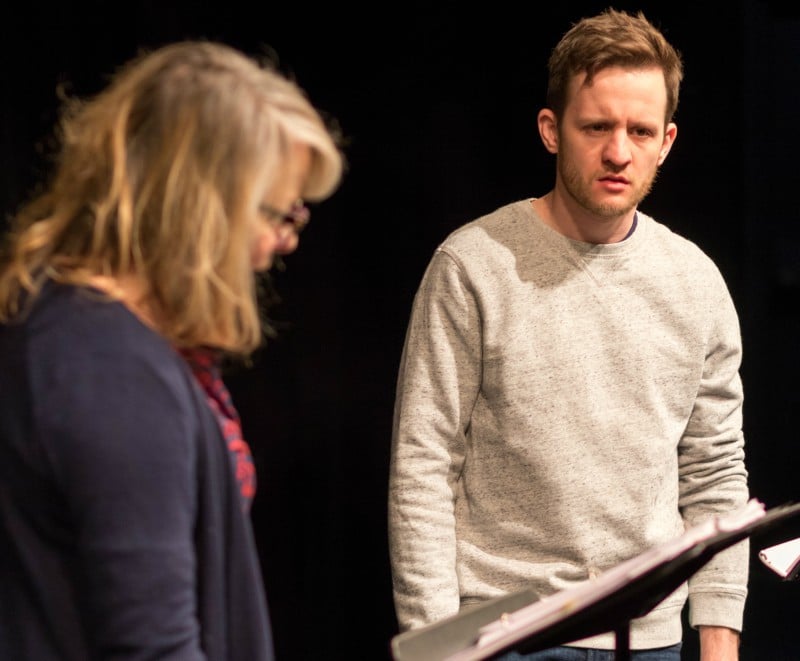
Tasha Lawrence and Nick LaMedica in ‘The Couches.’ Photo by Adams VisCom.
David Jacobi: I was furious. As someone who didn’t grow up rich and was raised by a single mother in a very modest house, it really bothered me to learn that people could be so rich that they don’t have to suffer consequences. But then I had to look inward and wonder why I was so angry at them. I started to think that maybe Ethan never had a chance to be a normal human being. He was raised by very disturbed people who would just throw money at problems. I still blame him for what he did, but there’s just something about him that’s very tragic.
John Moore: I can see some similarities to the school shooter in Florida. He did this atrociously heinous thing, but a writer naturally wants to know what drove him to do that.
David Jacobi: Yes, and they just found out today the Florida shooter was a member of a white supremacist group, and those are the saddest, most terrified people in America. They have internalized their own fear and rage. They are just very broken people.
John Moore: You have said your play devolves into this Lynchian nightmare — and that you think it’s funny.
David Jacobi: Exactly. I tend to just look at everything I write through a lens of absurdism. It’s my way of getting through it. My plays tend to be funny, and I think that for the most part this is a comedy, too. It’s an extremely, extremely dark comedy, but I’m going for it. I think that by the end, there’s no real way to stage this except for in the most bizarre, David Lynchian, surrealist nightmare that I think the story really is.
John Moore: And wackiness ensues, right?
David Jacobi: Wackiness will always ensue.
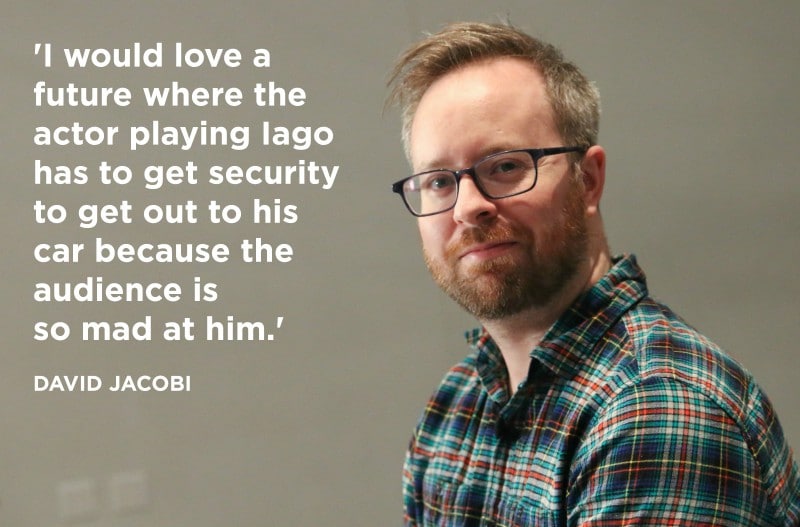
Photo by John Moore.
John Moore: Do you consider David Lynch to be one of your major influences?
David Jacobi: I love Ionesco. I love a lot of Sam Shepard plays. I adore Annie Baker‘s work. Jeff Augustin. Those people really have a handle on story and dialogue. I was also raised on The Twilight Zone marathons and comic books, and I feel like a lot of my work kind of fits that pop/punk aesthetic. Someone once lovingly told me that my work is considered ‘junk punk,’ which means that there are a lot of relics from the past in my work. That people are playing with broken, discarded ideas and things.
John Moore: You’ve written about race, hate crimes, unfair labor practices, drug addiction, often in the context of current events. What interests you most about exploring the latest headlines in your plays?
David Jacobi: I tend to write about problems and conflicts that existed when I was a kid and still exist now. And I like to look at them through the lens of how I felt about something back then, and how I feel now. Have I grown as a person, and if not, what’s holding me back?
John Moore: You once said that professional wrestling, for better or worse, was your introduction to theater. I really hope that you were being sincere when you said that.
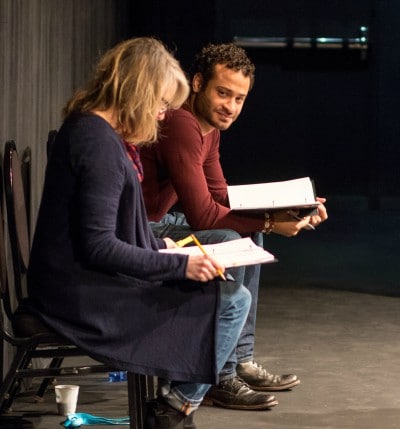
Tasha Lawrence and Cesar J. Rosado of ‘The Couches.’ Photo by John Moore.
David Jacobi: Oh, yeah. Out of all my influences, professional wrestling is probably the biggest. That was my entry into theater as an audience member. What really got me is that there was always a story. For example, this really happened: There was this pro wrestler who got on the microphone and he was just berating America to a New York audience. And then I read in the news the next day that as he was trying to leave the arena, he was surrounded by a bunch of angry fans and they tried to flip over his car. And try as we might, I don’t think we’ll ever get that sort of reaction from live theater. I would love a future where the actor playing Iago has to get security to get out to his car because the audience is so mad at him. I would just love for that to happen.
John Moore: Does the second week of development that you are afforded here at the Colorado New Play Summit perhaps set the DCPA apart in terms of new-play development?
David Jacobi: Yes. I really like getting a second bite of the apple. Having that second reading allows me to not try to get it all out of the way too soon. When I’m afforded more time like this, I can focus my energy on a couple of things. For example, right now my ending isn’t there yet. We’re experimenting with things. But we decided to let the original ending run for the first reading. I’m excited to see how the audience takes it, and then we can decide afterward just where that ending is at. The second reading just gives me so much more breathing room.
John Moore: What are your friends out there in the world saying about the DCPA and the Colorado New Play Summit?
David Jacobi: I’ve been namedropping the Denver Center ever since I got into the Colorado New Play Summit, and it always goes over well. People think I’m automatically fancier. The caliber of artists that the Denver Center brings in to help facilitate the playwright’s needs is just absolutely fantastic. I’m meeting a lot of theatrical heroes in my dramaturgs and directors and other playwrights, so this whole experience is really next level for me.
John Moore: What do you hope people get out of seeing your play?
David Jacobi: I want the audience to leave with this tiny bit of hope, because that’s how I always want them to leave my plays. But for this one, I really want them to think about the ways in which our economy tends to hollow out people. What are the ways in which we start treating people around us like inconveniences, like speed bumps?
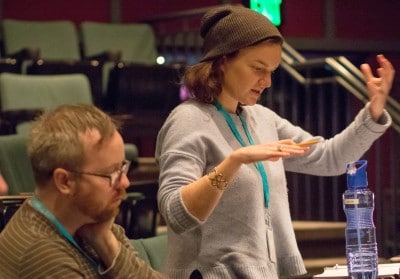
‘The Couches’ Director Caitlin Ryan O’Connell. Photo by Adams Viscom..
The Couches: Cast list
Written by David Jacobi
Directed by Caitlin Ryan O’Connell
Dramaturgy by Doug Langworthy
Stage Manager: Corin Ferris
Stage Management Apprentice: Amy LeGore
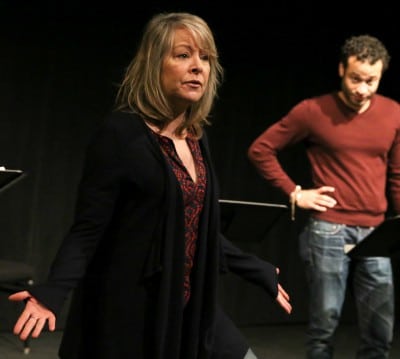
Tasha Lawrence and Cesar J. Rosado of ‘The Couches.’ Photo by John Moore.

Leave a Reply
Want to join the discussion?Feel free to contribute!